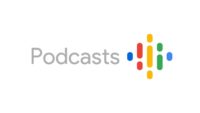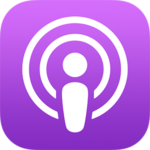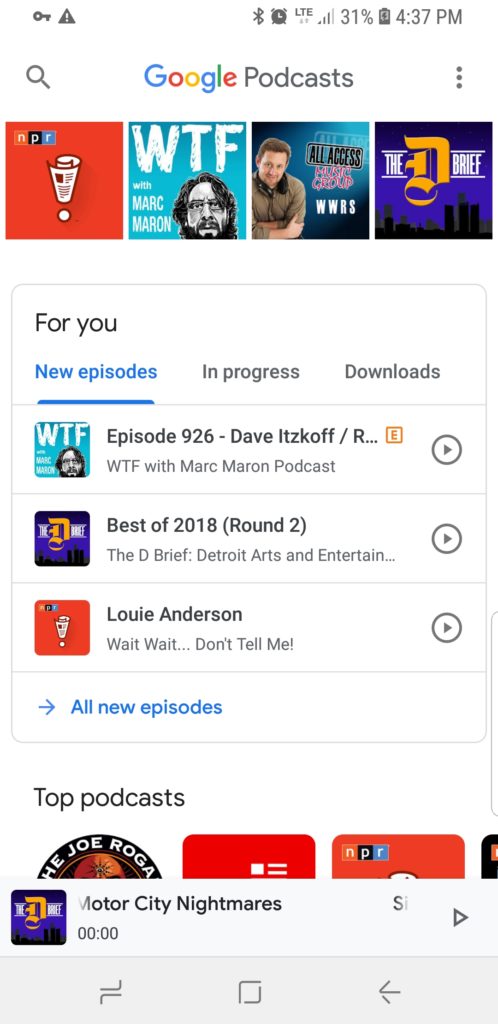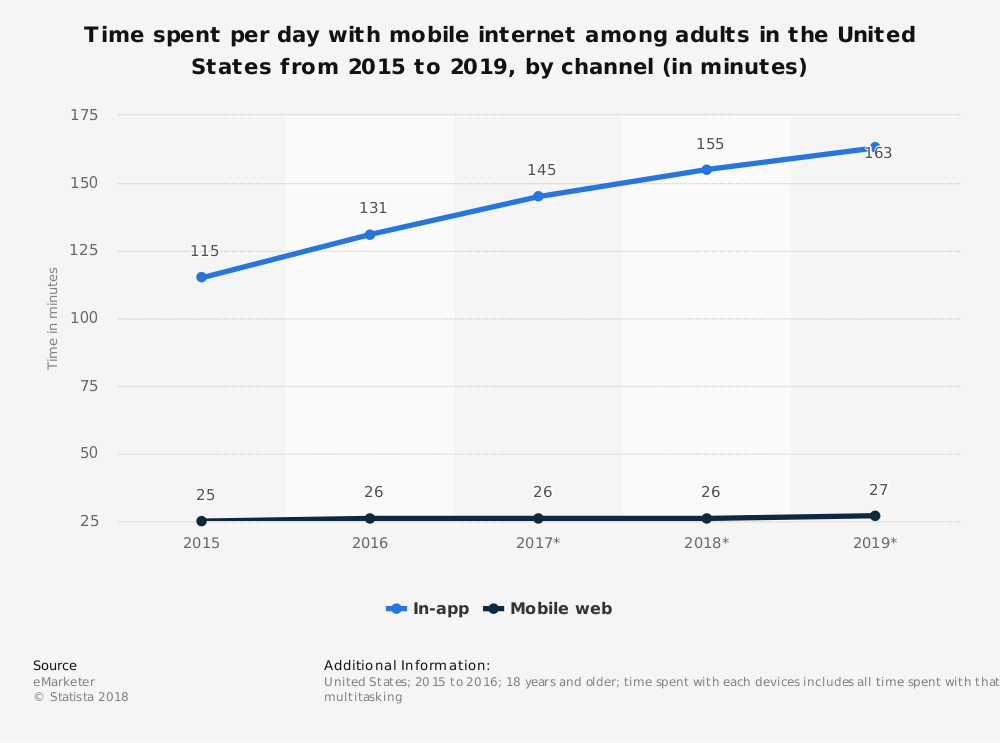 This week, Google launched a long-awaited “podcatcher” (an app for listening to podcasts). It’s called Google Podcasts. Early versions of the app have been there for a while now, but Google made it App Store official this week. Early reviews report that it’s a solid if unspectacular entry into the podcatcher field. It’s missing some of the features podcasters are used to, such as ratings and auto-downloads, but it’s clean and easy to navigate.
This week, Google launched a long-awaited “podcatcher” (an app for listening to podcasts). It’s called Google Podcasts. Early versions of the app have been there for a while now, but Google made it App Store official this week. Early reviews report that it’s a solid if unspectacular entry into the podcatcher field. It’s missing some of the features podcasters are used to, such as ratings and auto-downloads, but it’s clean and easy to navigate.
However, people aren’t excited about this app because it’s got better features than all of the other podcatchers out there. No, the reason why this podcatcher is generating buzz is simple — it was developed by Google, the company that makes the Android operating system. According to Nielsen Scaborough, more than 103 million people use Androd phones in the U.S. alone. Until now, podcasters have had a hard time reaching those Android users.
Over the last several years, podcasting has seen slow but steady growth. Surprisingly, hit podcasts like Serial have not resulted in a substantial spike in the number of people listening to podcasts. However, when Apple made a change to its iOS operating system, podcasting experienced significant growth.
In 2012, with the introduction of iOS6, Apple separated podcasts from iTunes, giving it its own stand-alone app, called Podcasts. At the time, you had to go to the Apple App Store and download this app. But in 2014, with the introduction of iOS8, Apple started pre-installing the Podcasts app on all of its phones. When you unboxed your brand new iPhone, there was a purple Podcasts icon on the home screen the moment you first turned it on. This change, which made it easier for people to listen to podcasts, spurrred significant growth in podcast consumption.

By contrast, before this week, on an Android phone, it was more difficult to listen to a podcast. First, you had to go to the Android App Store and download a podcatcher app. In other words, when it comes to podcast listening, Android phones are still stuck back where Apple was prior to 2014. This extra step of downloading an app has a significant impact on overall listenership — about five times as much podcast listening happens on iOS devices as Android devices. The ease of use has to be a factor in this divide between podcasting listening on the two biggest mobile eocsystems.
That’s why many people in the podcasting space — myself included — believe “the one thing” that will make podcasting truly go mainstream will be technological change. That may start with Google making it easier and more seamless for people to listen to podcasts.
In fact, there have been rumblings about Google finally embracing podcasting for a while now. They’ve had a team in Seattle working on the project, a number of key players in the podcasting space have reported talking to Google under NDA, and there’s been rumors that they’ve stealthily been attending events like the Podcast Movement conference for some time now.
Those rumors and came to a head recently when Zack Reneau-Wedeen, Google’s Product Manager, spelled out the company’s vision for podcasts in a five-part interview series. Reneau Wedeen articulated what the podcast community had been saying for some time: “It’s an ambitious but achievable goal to have that population constitute a doubling of the industry size.”

Google’s Vision for Podcasts
Of course, Google could enter the space by simply copying what Apple has already done successfully: introduce a stand-alone podcasts app that is pre-installed on every Android phone. But Google laid out a different vision, which aims to both marry podcasts to its core strength: search
And in the context, provide a seamless experience across multiple devices, including its Google Home smart speaker. To that end, it’s introducing a contextual app. In other words, the podcast player functionality is pre-installed in your phone, but you don’t see it until you need it. If you open up Google on an Android phone, search for a podcast, and then click on it in the search results, Google will seamlessly open that podcast in its new Podcasts app.
This is an interesting move because it is aimed specifically at people who are not currently podcast listeners. It presumes that people’s starting point in their search for a podcast will be Google’s search engine (or a link on a website). In theory, this could open up podcasting to a whole new audience. It could also change the way podcasters market and grow their shows.
At the moment, it’s not hard to listen to a podcast on an Android device, but it’s a little harder than it should be. As a result, the conventional wisdom among podcasters has always been to go find people who already know how to listen to podcasts, and then, within that group, find a subset that is interested in your topic.
For example, I host a podcast about Detroit. To market it, I would need to first find podcast listeners, and then look for Detroiters among those listeners. For example, advertising in other Detroit podcasts would likely be a more effective use of marketing money than advertising on Detroit billboards and hoping that some of the people who see those billboards know how to listen to podcasts.
Google hopes to change that. After all, just about anybody who sees a billboard knows how to look something up in a search engine. If the transition from the search engine results to podcast listening is an easy 1-click solution, it could be a great way to attract new listeners to podcasting. In essence, Google is creating a new gateway for the uninitiated.
But will it work in practice?
We won’t know for sure until we hear hosting companies like Libsyn and Blubrry report downloading sources back to us in the coming months. Some experts, like James Cridland, the author of the Podnews email newsletter, are optimistic. I am more skeptical.

Podcast listening is, by and large, an activity that happens on mobile devices. And every day, Americans spend 163 minutes in apps on their mobile phones, while they only spend 27 minutes on mobile browsers. So while a search for something on a desktop computer is likely to start with Google in a browser, it’s not clear that a search on a smartphone — where most podcast listening is happening — will start with Google’s search engine or with a link on a website. It seems much more likely that this search would start in an app.
Will searches for podcasts start in the Google app? Or will people look for a podcasts app?
And what if that podcasts app is hidden and people don’t know that it’s there?
A Podcasts App Icon on the Home Screen?
Yes, the functionality of Google’s Podcasts app is already on your Android phone, but an important question has gone curiously unanswered in all the reviews of the app so far: Will an icon for that app appear on the Android home screen at its unboxing? Online speculation assumes that it will be, but I have yet to see any confirmation of that.
This is no small detail. Our sister company, jācapps, has built over 1,200 mobile apps, mostly for radio stations. If there’s one thing they’ve learned in that time, it’s this: It doesn’t matter how good your app is, if you don’t tell anyone it exists and what it does, it won’t get used. Apple learned this same lesson four years ago. After all, the factor that drove a sharp podcast downloads increase on Apple devices wasn’t the creation of the stand-alone Podcasts app; it was when Apple decided to put a big purple Podcasts icon on every iPhone home screen at its unboxing.
If Google’s actions fall short of an icon on the home screen, we probably won’t see as big a podcast surge as we hope for, and we might not experience a significant increase in podcast listening at all. A Podcast app icon on the homescreen at the unboxing is the best means Google has to let people know they can easily listen to podcasts on their Android phone. After all, currently, the problem isn’t that you can’t listen to podcasts on Android phones at all, it’s just that it takes a few extra steps. Has Google’s approach eliminated those steps with its contextual app? Or is the icon on the home screen the missing piece?
It’s tempting to think that Google can do no wrong because, well, they’re Google. But the company has misfired in the podcasting arena before. A couple of years ago, Google began including podcasts in its native Google Play Music app to much fanfare. Unfortunately, that did not turn out to be the game-changer that many people, including myself, had hoped. The issue? Google didn’t do enough to tell people that podcasts were available in the Google Play Music app! Perhaps that’s why I’m holding back my enthusiasm this time around.
My concern is that Google, in its desire to leave a unique mark on the podcasting industry, will fail to give podcasters what they really need because it’s too similar to Apple. But the bottom line is this: We know that adding an app icon to the home screen on Day One increases downloads. That icon would tell every Android user the functionality is sitting therre on their phone. In adding it, Google would send a powerful message to Android owners: “We think podcasts are something you should check out.”
If you’re interested in learning more about Google’s new Podcasts app, James Cridland has put together a helpful FAQ.
If you want to learn more about podcasting, you should head out to the Podcast Movement conference in Philadelphia July 23-26th. We’ll be there, hosting the Broadcasters Meet Podcasters track. Google will be there this year, too.
More Digital Tips
- Interview Questions When Hiring Your Radio Station’s Next Digital Marketing Manager
- Shownotes: A Trick Radio Morning Shows Can Steal From Podcasters
- 7 Digital Skills Broadcasters Can Learn to Level Up in 2023
- Generating Sales Leads with Content Marketing: Where to Start
- How to Optimize Your Radio Station’s Blogposts for Search Engines
- A Simple Digital Treat to Thank Your Radio Listeners This Thanksgiving - November 13, 2023
- Interview Questions When Hiring Your Radio Station’s Next Digital Marketing Manager - November 6, 2023
- A Radio Conversation with ChatGPT: Part 2 – Promotions - October 30, 2023





Leave a Reply